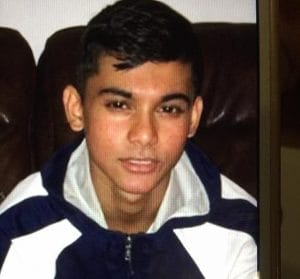 Nasar Ahmed, 14, died of an allergic reaction last November. Photo: Family handout
Nasar Ahmed, 14, died of an allergic reaction last November. Photo: Family handout Nasar Ahmed had a history of severe asthma, eczema and was allergic to milk, fish, nuts, wheat, apples, oranges and some meats.
While in detention at Bow School in London, Nasar went into anaphylactic shock after eating a tandoori chicken dish in November 2016. He complained of breathing problems and then collapsed. The dish turned out to contain milk, to which he was allergic.
Instead of using his epinephrine auto-injector, which was kept at school, staff called an ambulance. Nasar was taken to the Royal London Hospital where he was put on oxygen. A brain scan showed he was unresponsive and he died four days later, on Nov. 14, 2016.
EpiPen “Could Have Changed Outcome”
“The staff saw Nasar’s EpiPen and considered using it, but did not. If the EpiPen had been used promptly and Nasar had been administered adrenaline, there is a possibility but not a probability that this would have changed the outcome,” Coroner Mary Hassell said, according to the Guardian newspaper.
Speaking to reporters outside the coroner’s court Friday morning, Nasar’s mother Ferdousi Zaman said the school had let her son down and “failed their duty of care.”
“If he has anaphylaxis I give him his EpiPen. They are first-aiders, they are more knowledgeable than me,” she said.
The inquest detailed:
- In Nasar’s allergy care plan, there was no mention of using an auto-injector should the boy have an allergic reaction.
- Staff had underestimated how serious Nasar’s asthma was, listing his care plan as “mild to moderate” instead of “severe.”
- Staff were also unfamiliar with students’ care plans, unless there was a class trip.
The coroner wrote: “Knowledge of the care plan would not have changed the decision … but the lack of familiarity of the [detention] supervisor and nearby members of staff with Nasar’s allergy action plan and medication box used up time in an extremely time-critical situation.”
Hassell said she will be writing five Preventing of Future Death (PDF) reports to his school, the London ambulance services, Barts Health NHS Trust, the chief medical officer of England and the boy’s doctor.
In a recommendation to London ambulance services, Hassell said: “The paramedic said ‘don’t give the EpiPen’ because there were no classic symptoms of anaphylaxis. The reality of giving a dose of adrenaline is that it is unlikely to do any significant harm, whereas the potential good of giving an EpiPen is lifesaving.”
The recommendation to the chief medical officer asks whether auto-injectors should be provided in public spaces alongside defibrillators.
In a response to the inquest into Nasar’s death, the principal of Bow School issued a statement: “All of our thoughts remain with Nasar’s family, friends and the whole community at this very difficult time. The safety of all of our students is, of course, our overriding concern and following Nasar’s death we rigorously reviewed all of our safety procedures. We also continue to provide extensive training for our staff and to update and review our procedures as needed.”
See also: Eczema Played Role in London Teen’s Dairy Allergy Tragedy





